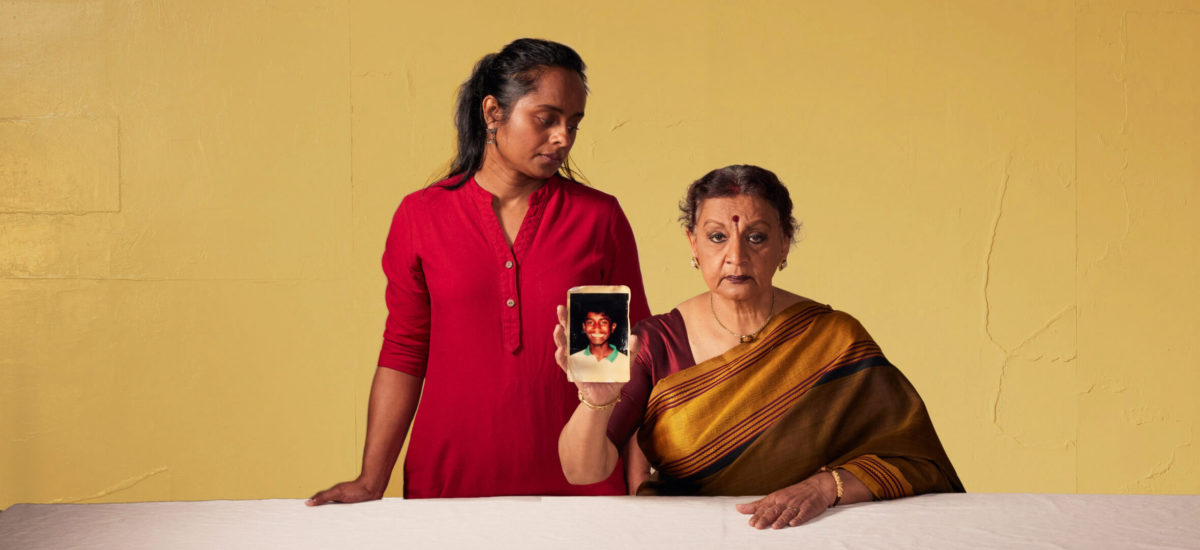Photo courtesy of Belvoir St Theatre
Following the runaway success of his first play, Counting and Cracking, writer and director S. Shakthidharan has produced a new play called Jungle and the Sea, which has received enthusiastic reviews since it debuted in Sydney in November.
The play follows the lives of a Tamil family torn apart by the civil war. The father, blinded in the bombing of a church in Jaffna in 1995 where they were taking shelter, and a daughter leave for Australia. The mother, Gowri, stays behind with two other daughters while the son joins the LTTE. After the family’s separation, the mother decides to blindfold herself and refuses to leave until she can be reunited with all her children. She searches for her missing son.
Most of the play is set in the north during the years 1995, the final days of the war in 2009 and the present day in 2022. A revolving stage is used at different speeds to indicate travel between eras and locations. There is no scenery apart from bullet holes around the theatre walls.
Gowrie, played by Shakthi’s mother Anandavalli, embodies the plight of mothers and wives in the north and east who are still searching for their disappeared relatives more than 13 years after the war ended with continuous protests that show that there can be no peace or reconciliation without justice.
Shakthi answered questions from Groundviews about the impact of the play and what it is like to direct his mother.
Does the title refer to the fact that people were caught between the jungle and the sea?
For one specific section of the play – yes, it does. Overall, the play also examines the relationship between humans, animals and nature; what is the same between all these elements, and what distinguishes us as humans.
What are the links between your two plays?
They do not share any characters or location; they are thematically linked. Both plays examine a period of Sri Lanka’s history and the reverberations that still exist from that period in the present day. Counting and Cracking was written in honour of those who tried to halt Sri Lanka’s descent into civil war. The Jungle and the Sea is written in honour of those who survived the war and the ways they found to uphold their dignity even when everything else was falling down around them.
How was the experience of doing this play different to Counting and Cracking?
With Counting and Cracking I spent years trying to convince the Australian arts industry that this was a story worth telling and years trying to convince much of the Sri Lankan community that theatre was a useful tool for us. It was an uphill battle. After the success of Counting and Cracking – both in terms of impact with the community and also acclaim from the industry – these factors changed massively. The Jungle and the Sea was encouraged by both the industry and the community. We already knew the cast for it because of the exhaustive casting process for Counting and Cracking. It was a seismic change, really, between the two productions. The formerly impossible was now something more like business as usual.
Since obviously you were not there to witness events such as the end of the war where did your material come from?
I spent time in the Vanni listening to people who had lived through the events of the play and discussing it with them. I did the same with people who had since fled to Australia and were living here. I also read as many personal testimonies as possible, which have been collected by various community and NGO organisations. Throughout the drafting process I went back to community members who had on the ground knowledge about the events for feedback and constructive criticism, and the script would change accordingly. Even now, deep into the season for the show, I am still changing script elements based on feedback from members in the community who were there. It is an ongoing process.
You portray several cross cultural and multi ethnic relationships in the play. Is this to portray the universality of human feelings?
The events that have happened in Sri Lanka’s history have reverberations across the country and across the various Sri Lankan diasporas. No one is untouched and everyone has a responsibility or relationship to what happened. We cannot build a better future and avoid repeating the mistakes of the past unless we are all involved in the conversation. It was important to me to include various Lankan communities in this story and explicitly involve us all in the reception and discussion of it.
Is there elements of your personal story in this play too?
There are no elements personal to my own life. But there are events related to people who are very close to me.
What was it like to direct your mother?
She is an artist too and we have to make sure the work in the rehearsal room is about our professional relationship rather than our personal one. But I also made a deal with my co-director, Eamon Flack, that he should take up the bulk of this particular task!
How has the new play been received so far?
It’s been overwhelming, to be honest. It is a very deep and moving play for audiences that has quite a profound impact. There has been enormous amounts of generous praise and also some generous criticism, and I have been trying to hold space with it all. The play has helped open up new, vulnerable conversations within Sri Lankan families and has brought wide attention about some of the things that happened in the war to the general Australian public, and I’m proud of that. Overall we have celebrated the courage, determination and passion of those who lived through the war and that has been our central message.


